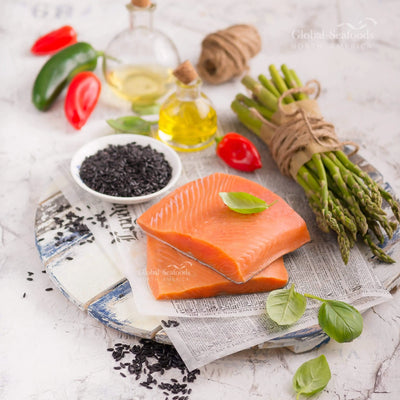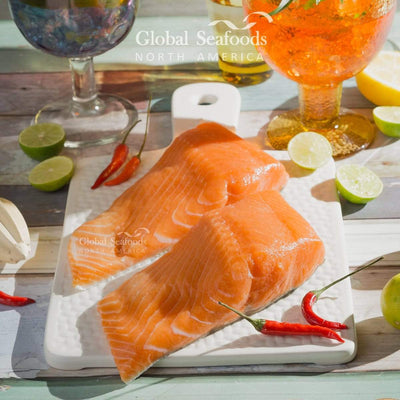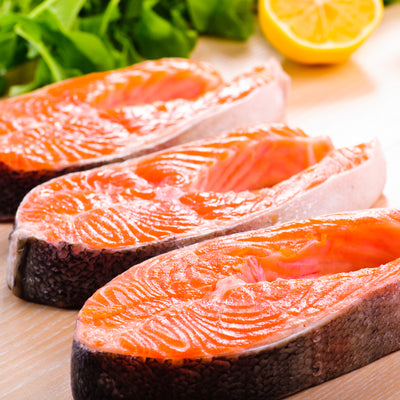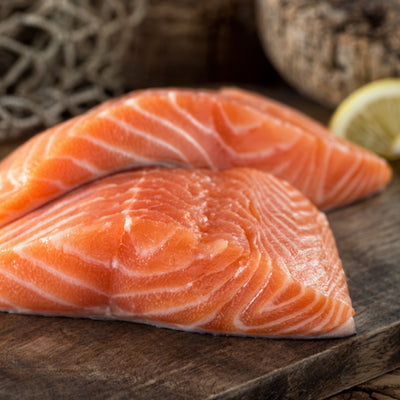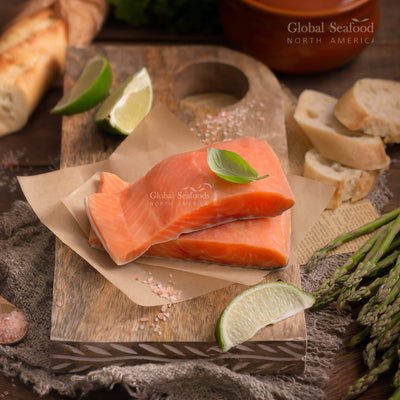Wild Salmon vs. Farmed Salmon: Health Benefits, Uses, and Insights
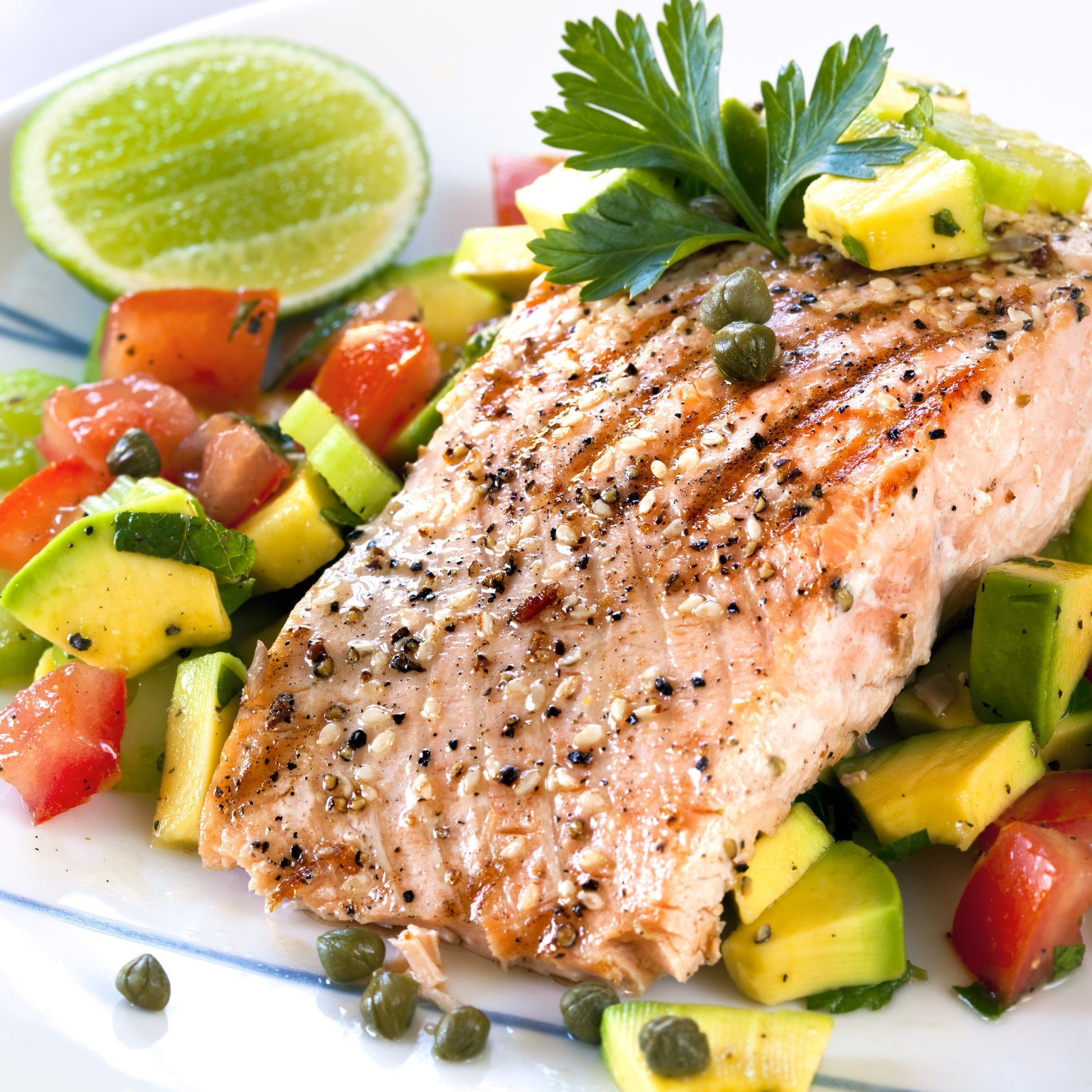
Wild Salmon vs. Farmed Salmon: Why Both Are Excellent Choices
Salmon is universally praised as one of the healthiest foods on the planet, thanks to its exceptional nutrient profile and versatility in cooking. Whether wild-caught or farm-raised, salmon provides valuable protein, omega-3 fatty acids, and essential vitamins.
Health experts like Dr. Mehmet Oz emphasize the importance of including salmon in your diet:
"Salmon is one of the best sources of omega-3 fatty acids, which reduce inflammation, improve brain function, and support heart health."
While each type of salmon has unique characteristics, benefits, and uses, both wild and farmed salmon contribute significantly to overall health and well-being.
Health Benefits of Wild and Farmed Salmon
1. Protein Powerhouse
Both wild and farmed salmon are rich sources of high-quality protein, containing all nine essential amino acids. This makes salmon an excellent choice for muscle repair, energy, and overall bodily functions.
-
Dr. Andrew Weil, a renowned integrative medicine expert, highlights:
“The high protein content in salmon makes it a vital part of a balanced diet, especially for active individuals and those focused on maintaining muscle mass.”
2. Omega-3 Fatty Acids
Salmon is packed with omega-3 fatty acids (EPA and DHA), essential for reducing inflammation, improving cardiovascular health, and supporting brain function.
- Wild salmon typically has slightly higher omega-3 levels due to its natural diet of krill and plankton.
- Farmed salmon, while slightly higher in fat overall, offers consistent omega-3 levels year-round.
According to Harvard Health, omega-3s from salmon can lower blood pressure, reduce the risk of arrhythmias, and decrease triglyceride levels, making salmon a top food for heart health.
3. Vitamins and Minerals
Both wild and farmed salmon are excellent sources of:
- Vitamin D: Supports bone health and immune function.
- Vitamin B12: Essential for energy production and red blood cell formation.
- Selenium: A powerful antioxidant that supports thyroid health.
Dr. Mark Hyman, a functional medicine expert, states:
"Vitamin D from salmon is a natural way to support immunity and protect against chronic diseases."
Wild Salmon: Nutritional and Culinary Highlights
Wild salmon are caught in their natural habitat and offer leaner meat with a distinct flavor profile.
1. Health Benefits
- Lower in Calories and Saturated Fat: Ideal for weight-conscious individuals.
- Higher in Antioxidants: Wild salmon contains astaxanthin, a compound that gives the fish its red color and supports skin and eye health.
2. Culinary Uses
- King Salmon (Chinook): Perfect for grilling or roasting due to its buttery, rich flavor.
- Sockeye Salmon: Bold and robust, making it excellent for smoking or baking.
- Coho Salmon: Delicate and balanced, ideal for poaching or adding to salads.
- Pink Salmon: Light and mild, great for quick sautés or canning.
- Chum Salmon: Versatile and budget-friendly, suitable for grilling or soups.
Farmed Salmon: Consistency and Versatility
Farmed salmon are raised in controlled environments, providing reliable quality and availability.
1. Health Benefits
- Higher Fat Content: Adds moisture and richness, making it ideal for raw dishes like sushi.
- Year-Round Availability: Ensures consistent access to this nutritious protein.
Dr. Walter Willett, a nutrition expert at Harvard, notes:
"Farmed salmon is a convenient and affordable way to get your omega-3s and high-quality protein, particularly for those without access to wild fish."
2. Culinary Uses
- Atlantic Salmon: Best for sushi, sashimi, or creamy dishes due to its mild, buttery flavor.
- Steelhead Trout (Farmed): A sustainable alternative to wild salmon, great for pan-searing or grilling.
- Farmed Coho Salmon: A versatile choice for a wide range of recipes, from pasta to baked fillets.
Sizes and Harvesting Times
Wild Salmon
Wild salmon are seasonal, harvested during their natural migrations. Sizes vary by species:
- King Salmon: 20–50 pounds, harvested May–September.
- Sockeye Salmon: 5–15 pounds, harvested June–July.
- Coho Salmon: 6–12 pounds, harvested late summer to fall.
- Pink Salmon: 3–5 pounds, harvested July–September.
- Chum Salmon: 8–15 pounds, harvested June–November.
Farmed Salmon
Farmed salmon are raised in controlled environments, ensuring consistent sizes and availability:
- Atlantic Salmon: 8–12 pounds, harvested year-round (18–24 months after hatching).
- Steelhead Trout (Farmed): 5–10 pounds, harvested within 12–18 months.
Key Advantages of Both Wild and Farmed Salmon
Wild Salmon Positives
- Natural Diet: Rich in omega-3s and antioxidants.
- Lean and Flavorful: Perfect for those seeking bold, rich flavors.
- Seasonal Freshness: Adds variety to your menu during harvest months.
Farmed Salmon Positives
- Sushi-Grade Freshness: Farmed salmon is often the preferred choice for sushi due to its higher fat content and buttery texture.
- Year-Round Availability: Reliable access to a healthy protein source.
- Consistent Size: Makes portioning easier for chefs and home cooks.
Dr. Oz highlights the balance:
"Both wild and farmed salmon are fantastic sources of protein and omega-3s. The choice depends on your dietary needs, taste preferences, and access to fresh seafood."
FAQs About Wild and Farmed Salmon
Q1: Which salmon is better for heart health?
A: Both wild and farmed salmon are excellent for heart health due to their high omega-3 content. Wild salmon may have slightly higher levels, but farmed salmon offers consistent amounts year-round.
Q2: Can I use farmed salmon for grilling?
A: Absolutely! Farmed salmon’s higher fat content makes it moist and flavorful on the grill. Atlantic salmon is particularly well-suited for grilling.
Q3: Is wild salmon always more sustainable than farmed salmon?
A: Not necessarily. Many farms now use eco-friendly practices, making responsibly farmed salmon a sustainable choice.
Q4: What’s the best way to cook Sockeye salmon?
A: Sockeye salmon’s bold flavor and firm texture make it ideal for cedar plank grilling, baking, or smoking.
Explore Premium Salmon Selections
Experience the best of both wild and farmed salmon with these top-quality options:
For more insights and recipes, visit the Global Seafoods YouTube Channel.
Conclusion: The Best of Both Worlds
Wild and farmed salmon each bring unique benefits to the table. Wild salmon offers lean, bold flavors and seasonal freshness, while farmed salmon provides consistency, versatility, and year-round availability. As Dr. Oz and other experts agree, incorporating salmon into your diet—whether wild or farmed—is one of the healthiest choices you can make.
Please don’t forget to leave a review.
Also in News

How to Make Sea Bream Sushi With Dry-Aged Tuna & Crab Roll — Step-by-Step With Chef Joshua
A complete guide to making Sea Bream sushi at home, including filleting, curing, slicing, and building a Dry-Aged Tuna & Crab sushi roll. Chef Joshua shares professional tips for restaurant-quality results.

Cooked Crab for Game Night: Everything You Need for a Perfect Seafood Party
Take your game night to the next level with a Cooked crab party. Learn the best recipes, cooking tips, and hosting hacks for a memorable seafood feast.

Steam Crab for Date Night: A Romantic Guide to the Perfect Seafood Feast
Make your next date night unforgettable with a romantic Steam crab experience. This guide covers everything you need to know, from ambiance to the best crab varieties.


